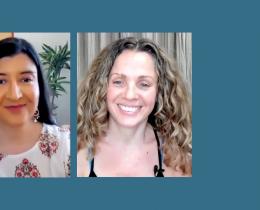Marianne: Women are slowly achieving more leadership positions in many sectors, but we are still far from parity. For example, though we made strides in this last election, women still make up only 18% of Congress. What obstacles do you think keep women from entering and advancing through the pipeline, and what do you think we can do to change that? Do you think we just don't see ourselves there, or is it because there are structural obstacles?
Cecile: I think that it’s absolutely all the structural obstacles—we could go through the sexism at every level and all the additional hurdles women have to leap over. I certainly saw them first hand with my mother [Ann Richards, former governor of Texas], but I see them now every day with the women we work with who are in office and who are running for office. So those hurdles exist, and that's how it is. But I think one of the major obstacles we face is that we keep thinking there's going to be a perfect moment, where someone is going to come to us and say, “Wow, you would be perfect to run for the United States Senate.” Or, “I really think we should put you forward for State House or governor.”
We also think there's a perfect moment in which our children will be the right age; we will have all the correct degrees; we will know the right people; and we will have had all the correct experiences. That simply isn't how life works. As women, we're so caught up in doing everything right that I think we are preconditioned to wait for the perfect time—it just doesn't happen.
When I speak to young women in their 20s. I say, “Look, the most important thing to learn is to just say yes. Whenever the next opportunity comes to you, don't think about whether you have the right clothes or the right degree, just say yes.” It is like dropping a match on kindling. They just need permission to go out and do the next thing. It is hard for women to do.
Marianne: Why do you think it’s so hard for women to say yes to opportunities? Does that come from the media, cultural conditions, or our nature? It seems important to figure out where it comes from so we can transform it.
Cecile: I am not exactly sure where it comes from. I think that we spend a lot of our lives taking care of other people, whether it's our children, spouses, or parents. We don't put ourselves first. I don’t know if it’s because it’s simpler that way, fear of failure, or we are conditioned to believe that we need to make sure we are taking care of everyone else before ourselves.
I'm so proud of the women I do see in public office and in campaigns. I think it takes a super-confident and super-resilient woman to put herself into the political environment these days. I don't know all the reasons why we hold back, but I do believe, as women, we could do even more to encourage and support the women we know that make that leap.
Marianne: Sometimes this conversation is framed as a fairness or equality thing, but why is it important to not just women, but the United States and world, that women are equally represented at the table?
Cecile: There are a billion equity reasons, but from my area, women’s health, the classic example was the debate over healthcare and whether or not maternity benefits would be covered by health insurance. We had members of the United States Senate arguing against it, because they were never going to need maternity benefits.
It's as fundamental as that. Perhaps the most unique thing about women is that we reproduce. We have children. It’s an essential part of humanity and yet, when you don't have women in the room making fundamental decisions about women's health and reproduction, then all the joys and challenges that happen once you do have children—childcare, healthcare, and education for kids—are not represented form your point of view. It's critical that you have women debating these policies.
I could give you countless examples in the Affordable Care Act where if it had not been for Senator Barbara Mikulski or Senator Debbie Stabenow—I could go down the list—that bill would look radically different. It is in large measure because of the women in Congress, and I include House Democratic Leader Nancy Pelosi in this as well, that women's health made such an advance in this bill. It simply wouldn't have happened otherwise.
Marianne: We also need to see more examples of successful women leaders and role models. Your mother, former Texas governor Ann Richards, was a hero to so many people. What did you learn growing up with such a passionate woman?
Cecile: My mother was a housewife. She never worked outside the home until Sarah Weddington, who was then in her 20s, wanted to run for the State House and couldn't find anyone to run her campaign. She asked my mother to do it. It was really a radical change. My mom wasn’t a career politician like Madeline Albright or others. She followed what was considered a traditional role for women. It wasn't until much later that she really came into her own, had her own career, and had her own independence.
When she first ran for public office, it was because the folks in our town had asked my dad to run and he didn't want to. He looked around and said, “Well, I don't know. Ann, do you want to run?”
She was never on the top of anyone's list and that's what she always said to women, “Don't wait until they ask you, you've got to just push your way through that door and demand to be part of the process, because if you're waiting for someone to ask you, it's likely not going to happen.”
Marianne: Sometimes it's hard to be a powerful, ambitious woman and still be liked. We see that all the time with the sexist treatment that happens to many women leaders. I think your mother managed to be a strong figure and be revered and beloved. What qualities do you think your mother had that made her so special and such a dynamic leader?
Cecile: She was a person who wanted to be loved, too. That was part of her personality. She was a very public person, but she wasn't universally loved because she really pushed the envelope on a lot of things that made people uncomfortable—like race, gender, and sexism in the workplace. I think she was able to do a lot of it because she used humor to disarm people, and perhaps point out what some people would think of as the inanities of what happens in political and public life.
I also think that Texas is a very different kind of place and she had that sort of unique Texan folk quality that was disarming to people. Her father didn't have much education, and worked his entire life, but was a great storyteller. He was just someone who was universally loved in his community. I think my mother took a lot of that from him and understood how you could disarm people, even the folks that you didn't agree with, by using humor. She also, in the same way that I believe Nancy Pelosi has been so successful, really understood that you have no permanent enemies and no permanent friends in politics. Someone who's against you one day, you're going to need desperately later on. So never burn bridges, never do things to make people feel that they can't save face. She had a real knack for that.
But I don't think she took the easy road. I think she obviously appointed more women, African-Americans, Hispanics, and openly gay and lesbian people to office and positions in Texas than all the previous governors combined. She did try to open up the government in that state in what was considered by some people to be a revolutionary way.
Marianne: What do you think are the ingredients for successful leadership? How would you describe your own personal leadership style or philosophy?
Cecile: I started as an organizer in the labor movement. In the early days, I organized garment workers so I spent most of my time trying to help folks to help themselves get a better lot in life. And I think that I learned early on to really listen to folks and understand where they're coming from. I'm very proud of that work, but I’m also really proud of the work that our folks do every day at Planned Parenthood to help young people and women who often have no other healthcare provider, and to make sure that what we're doing is actually helping them.
Marianne: I know we often focus on the hierarchy of elected leaders, but the truth is that we can all be active citizens and have enormous impact. You've had the opportunity to meet with women across the country, young and old, to talk about the importance of civic engagement and participating in our democracy. What did you learn through that experience?
Cecile: It was fascinating that no matter where I went to help ensure that women got out to vote—every campaign headquarters, every phone bank, every block walking—the vast majority of the folks participating were women of every age.
Someone told me the other day that an extraordinary percentage of the volunteers in President Obama's reelection campaign were women. We know, too, that in the 2012 presidential election there was the largest gender gap ever in the history of Gallup polling. I do think women really came into their own in this election. They not only elected a lot of women to office but were determinative in the direction of the country.
My hope is that now this rising electorate—the most diverse generation ever in our history, voting in bigger numbers than they did four years ago, and not just women, but young men as well—really has the opportunity to completely shape the future.
Marianne: The Omega Women's Leadership Center has been exploring the relationship of women to power and the need to create a new paradigm of power. What does power mean to you, and how do you think women's relationship to power needs to change or shift?
Cecile: It is all about women taking their power and asserting it. I think power is something you have to take and use. It's just not given to you. I've been an organizer my entire life. The only thing you get is what you fight for and nothing more. I come out of an activist tradition and believe that every day we have to push forward. Don't be patient, don't wait for someone to ask you, and don't think everyone's going to like you, because if you're not pissing someone off, you're probably not doing your job!
Change happens because people are bold and audacious. Who could have imagined that in our lifetime a president in an inaugural address would champion and hold up the great leaders of Seneca, Selma, and Stonewall? These are not people who in their lifetime made people comfortable. We've got to be willing to make more people uncomfortable and push for the power that we deserve. I think it's happening and I feel enormously hopeful.
Marianne: This interview series is called What's Possible. What do you think is possible when women, half of humanity, take their equal place in positions of influence in our government and society?
Cecile: I think the world would be a lot better off. I think we are seeing that everywhere. You saw what happened on the Violence Against Women Act, when Congress refused to do anything, literally refused to take care of one of the most basic issues for women, the right to live without fear, the right to live without violence. They wouldn't have done anything if women hadn't continued to push, organize, and agitate on Facebook and Twitter. So to me, when we pull ourselves together and focus on what we want, there is nothing holding women back. It's beautiful when we see it happen.
Every single woman senator who joins the United States Senate, it's like each one of them grows another half foot taller. It is exponential the power that women feel when they are joined together in common purpose. One of the first things the Democratic women senators had ever done together was to support Planned Parenthood when we were on the ropes. The power that they gave to us and the power that they felt together, standing together for what was right, was incalculable. People respond to that.
Marianne: I have another question related to Omega's work, which reinforces the connection of body, mind, and spirit. Just looking at what's happening to women these days, we are expected oftentimes to give and give, and often deplete ourselves and forget to take care of our own health and well-being. You seem to be somebody who is so tireless and always out there. What do you do to self-care or to keep yourself centered, which I think is often a challenge for busy women?
Cecile: I'm not really good at that. I am privileged to have one of the most amazing jobs. I organized low-wage workers for many, many years, women who had no options. The one option they had was to fight for something better than the job that they had, so I live every day with the understanding that I am enormously privileged to be able to not only have a job, but to go and do something that is extremely important and rewarding. So I feel like I live in a rarefied world and that's what keeps me going.



